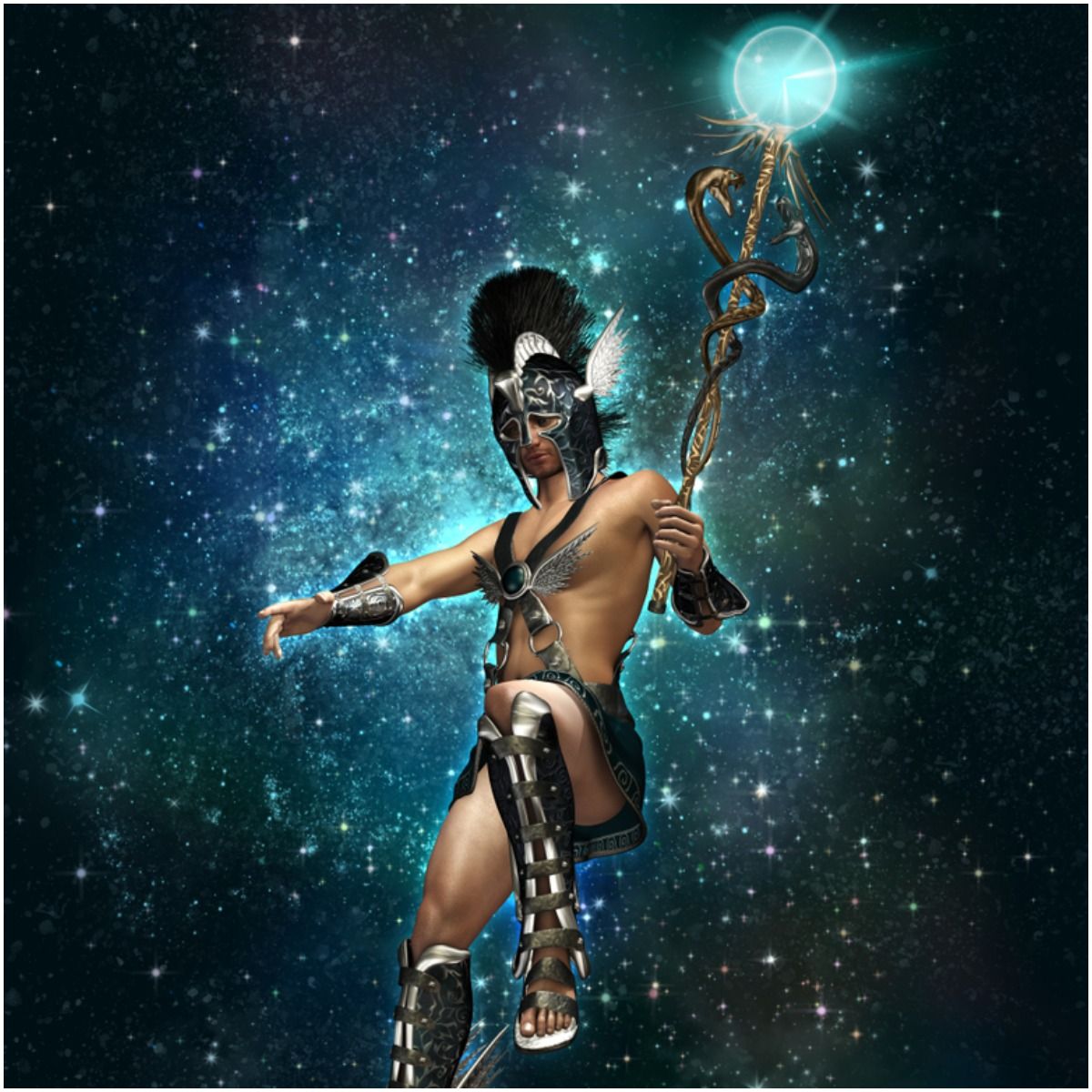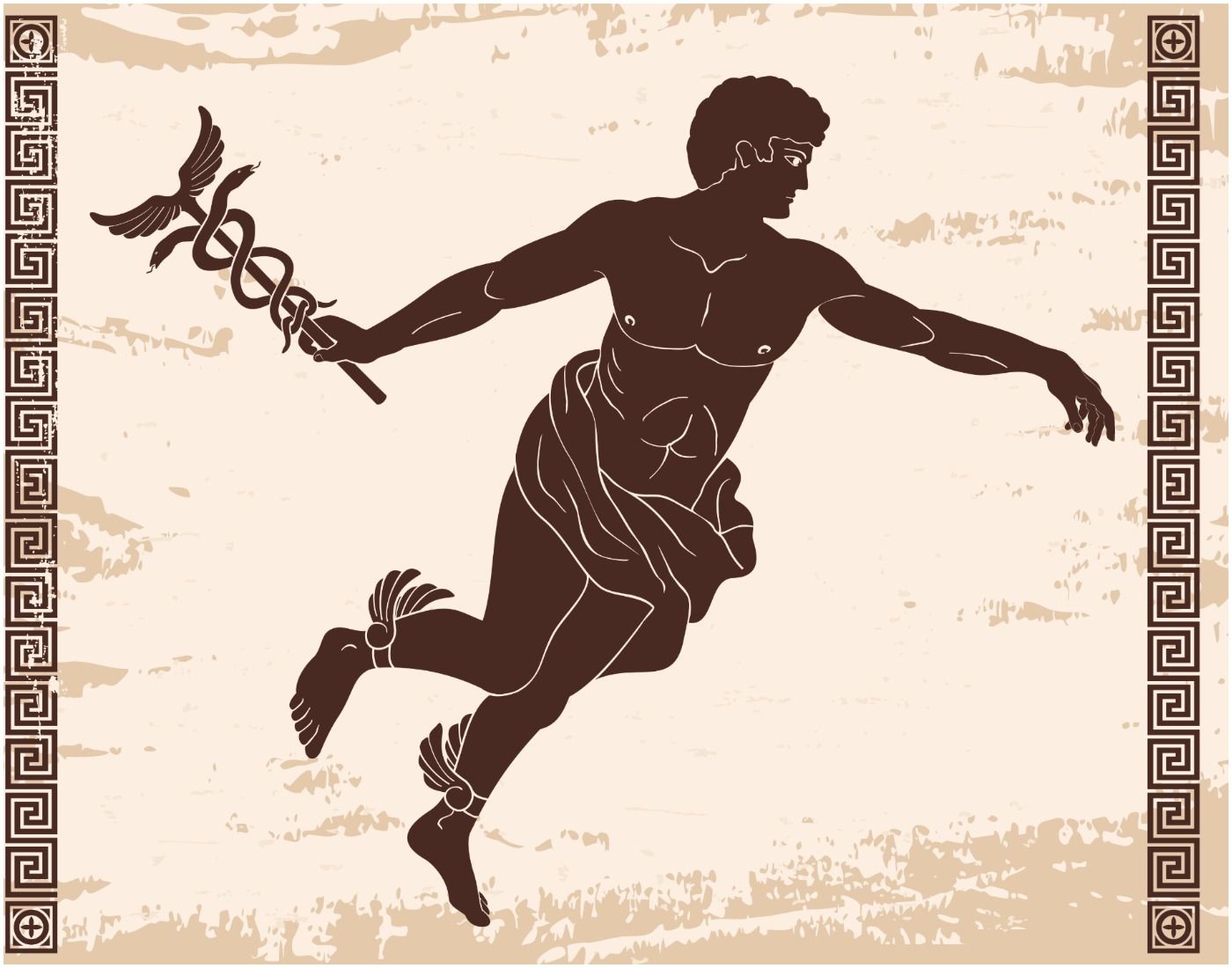He was the son of Zeus and Maia and the 2nd youngest Olympian god. Maia was the eldest daughter of Pleione and Atlas, plus, Maia is one of the Pleiades, the nymphs turned into stars by Zeus.
Here are 27 cool and interesting facts about Hermes and his siblings, children, powers, myths, and symbol:
1) He was one of the twelve Olympian gods who occupied the summit of Mount Olympus.
2) He is credited with numerous inventions, including the Greek numbers, alphabet, music, astronomy, and (in some legends) fire.
3) He was believed to have invented the sport of boxing and a few types of racing, hence, he was a patron of athletes.
4) He was also the patron of cowherds and shepherds, boundaries (and the travelers who cross them), wit and orators, liars and thieves, measures and weights, poets and literature, general commerce, invention, good luck, and profit.
5) To guarantee rapid delivery of his messages, the sky and thunder god in ancient Greece, Zeus, conferred upon him golden-winged sandals.
6) He was the Greek god who took care of those who went on a visit or a trip. For instance, some Greek people always sacrificed to him before they traveled.
7) He also had the role of being a conductor and messenger of souls, commonly named Psychopomp, to Heaven, Earth, and the Underworld. He was the only one, other than Persephone (wife of Hades) and Hades (the Greek god of the Underworld), who was allowed to leave the underworld without any type of consequence.
8) He invented the knucklebones and their use in gaming and later fortune-telling. Furthermore, he learned the art of augury from the Thriae (three virginal nymph sisters) and became a master of telling the future with pebbles in a bowl of water.
9) However, despite his reputation and patronage, he was thought to be strongly associated with both good fortune and fertility, with amazing festivals usually being held in his name.
10) A famous temple dedicated to him is found on Mount Cyllene, the place of his legendary birth.
11) In the Roman adaptation of the Greek pantheon, he was identified with the Roman god Mercury, who developed many similar traits and characteristics. For example, Mercury was also considered a god of commercial success and abundance, especially in Gaul (a region of Western Europe), where he was said to have been particularly adored.
Siblings
12) All the children of the god of the sky and ruler of the Olympian gods – Zeus are considered his siblings, nevertheless, he has a special younger-brotherly relationship with Apollo, the Greek god of music.
READ MORE: Facts About Hoia Baciu Forest Circle
Children
- Autolycus – a son who, according to Homer’s Odyssey, was rewarded with the trickery skill. Furthermore, Autolycus traveled with the Argonauts and taught Heracles the art of boxing.
- Palaestra – a daughter who was believed to have grown up in Arcadia.
- Eleusis – a son who was the hero of the town of Eleusis.
- Tyche – a daughter who was the goddess of luck and also the daughter of Aphrodite.
- Pan – a son who was the god of hunting and companion of the nymphs. Pan frequently appeared in scenes of the company of Dionysos, the god of the winemaking, grape harvest, and wine. Pan loved dancing, music, and singing. Pan’s mother was terrified of her son’s strange appearance, and she was named Dryope.
- Priapus – a son, however, there is some question as to whether his father was Zeus, Pan, the Greek Messenger God, or one of Aphrodite’s other many lovers. Priapus was a protector of flocks, beehives, and vineyards.
- Hermaphroditus – a son who, according to some scholars, attracted the love of Salmacis, a Naiad nymph.
- Angelia – a daughter who was the Daemon of tidings, messages, and proclamations.
Powers
13) He could fly as well as he could bring dreams and sleep to people.
READ MORE: 33 Types of Meditation
Myths and legends
14) He was born in a mountain cave on Mount Cyllene in Arcadia (southern Greece).
15) Only a few minutes after his birth, he invented the lyre, a musical instrument that he later donated to Apollo.
16) He couldn’t live without music; thus, he invented the syrinx, which Apollo liked too, so he offered him his golden staff.
17) Apart from the lyre and syrinx, he invented the pipes and the care of olive trees.
18) According to a myth, shortly after birth, he quietly left his home and hid the cattle of the god of the sun, Apollo.
19) Apollo got to know about his stealing and took him to Zeus and complained about it. Nevertheless, Zeus did not punish him and just laughed about it. To apologize, the Greek Messenger God gave Apollo the lyre.
20) He charmed Argus, a many-eyed giant in Greek mythology, to sleep with his flute and cut off its head. Hera, Queen of Olympus and Greek Goddess of marriage, as a gesture of thanks to him, scattered the 100 eyes of Argos over the tail of a peacock.
21) According to Homer (author of the Iliad and the Odyssey), it was he who guided King Priam (the last king of Troy) through the Greek army in order to retrieve the body of Hector, the first-born son of King Priam.
READ MORE: 46 Spiritual Quotes From Aristotle
Symbol Of The Greek Messenger God
22) He is usually depicted with the messenger’s staff, called kerykerion in Greek, also known as the caduceus, in his hand. The caduceus is a short staff entwined by 2 serpents, occasionally surmounted by wings.
23) This symbol is still present today, and many people tend to confuse this staff with the rod of Aesculapius, better known as the rod of Asclepius, which is used by paramedical and medical professions.
24) He also wears a winged cap and winged sandals.
25) A statue by Bellini is one of his most famous depictions, which portrays him with the caduceus in hand and with wings at his heels.
26) Hermes was also revered as the patron god of shepherds and flocks. In Boeotia, a region in ancient Greece, Hermes was credited with saving the town from a devastating plague.
27) Hermes is associated with the origin of wrestling in Greek mythology through his daughter, Palaestra.
Images credit – Shutterstock
READ THIS NEXT: 38 Socrates Quotes
Sources https://www.britannica.com/topic/Autolycus https://www.cliffsnotes.com/literature/m/mythology/ http://www.pantheon.org/articles/h/

